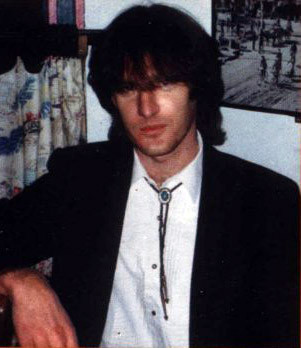The 1990s alternative rock scene was a cultural explosion, dominated by the angst-ridden sounds of Seattle grunge. Bands like Nirvana and Pearl Jam, fueled by the Pacific Northwest’s gloomy atmosphere, captured the zeitgeist with their raw emotion and introspective lyrics. Yet, amidst this flannel-clad revolution, a band emerged from the sun-drenched landscape of Tempe, Arizona, offering a different, seemingly brighter, sound: Gin Blossoms. While initially dismissed by some as “Grunge Lite,” a deeper dive into their music, particularly their breakout hit “Hey Jealousy Song,” reveals a far more complex and ultimately tragic story, deeply intertwined with the fate of their gifted songwriter, Doug Hopkins.
Back in 1992, when Gin Blossoms released their major-label debut, New Miserable Experience, the airwaves were saturated with the Seattle sound. Nirvana’s Nevermind was reshaping music, and Pearl Jam’s Ten was echoing with similar intensity. As a college student at the time, I, like many others, was drawn to the perceived authenticity of grunge, its darkness seemingly validated by the perpetually overcast skies of its origin. Kurt Cobain and Eddie Vedder felt “real,” their pain palpable in every lyric and distorted guitar riff. Gin Blossoms, with their catchy melodies and seemingly upbeat tempos, felt… different. They seemed manufactured for radio play, a sunnier, less substantial alternative to the “genuine” angst of grunge. This perception, however, was a superficial reading that missed the profound undercurrent of melancholy running through their music, most notably in “Hey Jealousy Song.”
This initial dismissal was compounded by the tragic news that surfaced just over a year later. In December 1993, word spread that “the guy from Gin Blossoms who wrote all their songs” had taken his own life. Mistakenly assuming it was lead singer Robin Wilson, the news painted a grim picture. It was later revealed to be Doug Hopkins, the band’s guitarist and primary songwriter, not Wilson, who had died by suicide. While the band continued, they never replicated their initial success. The narrative became one of a band overshadowed by tragedy, a story more nuanced and heartbreaking than initially perceived.
The narrative of Gin Blossoms and Doug Hopkins echoes, in some ways, the tragedy of Joy Division and Ian Curtis. However, unlike Curtis, who tragically ended his life on the cusp of Joy Division’s American breakthrough, Hopkins’ story is layered with the additional pain of rejection. He wasn’t just a tragic figure; he was a key creative force ousted from his own creation, forced to watch from the sidelines as “Hey Jealousy Song” and the album he largely crafted propelled his former band to fame. Doug Hopkins is a tragic figure in rock history, made even more so by the fact that his name remains largely unknown to many who sing along to “Hey Jealousy Song.”
The core of this tragedy lies in the events surrounding the recording of New Miserable Experience. Hopkins, a co-founder of Gin Blossoms and the architect of their signature sound, was battling severe alcoholism and depression. During the album sessions, his drinking reportedly became so debilitating that his ability to perform was compromised. While Hopkins denied these claims, his brother’s account suggests otherwise. As the album neared completion and tour plans solidified, the band faced a stark ultimatum: fire Hopkins or lose their major-label contract – their shot at the big time. They made the agonizing decision to remove Hopkins from the band, tasking their former manager, Laura Liewan, with delivering the devastating news.
Removed from the band he helped create and forced to sell his publishing rights for financial survival, Hopkins was left to witness the ascent of “Hey Jealousy Song,” the lead single he penned, to gold-record status. In a poignant 1992 interview, Hopkins confessed, “When it comes on the radio, I turn it off, because I don’t really want to hear that. It’s my song but I don’t enjoy it. I can’t listen to it because it just pisses me off.” In the aftermath, Hopkins channeled his creative energy into writing for a publishing house, even forming a new band, while his former bandmates performed his songs on national television. The weight of his clinical depression, compounded by this agonizing situation, proved unbearable. Despite support from loved ones, Hopkins tragically took his own life on December 5, 1993. He passed away unaware that another song he wrote for the album, “Found Out About You,” would also reach the top of the Billboard charts.
 Doug Hopkins, the songwriter behind the hit song "Hey Jealousy," in a reflective pose.
Doug Hopkins, the songwriter behind the hit song "Hey Jealousy," in a reflective pose.
It’s crucial to understand that this isn’t about assigning blame. The remaining Gin Blossoms members faced an impossible situation. Hopkins’ struggles were profound and pre-dated the band’s success. His previous suicide attempts underscore the depth of his pain. Furthermore, his bandmates had their own careers and livelihoods to consider, and by all accounts, Hopkins’ condition made touring and consistent performance impossible. The surviving members, as reported by People magazine, grappled with immense grief and guilt. Robin Wilson himself acknowledged the band’s debt to Hopkins, stating, “Without Doug and his songwriting, we never could have signed a record deal… Even Doug admitted we couldn’t have succeeded with him in the band.” Yet, Wilson also poignantly added, “He also felt we had betrayed him.”
Despite his undeniable foundational role in the band’s success, Doug Hopkins remains largely absent from the official Gin Blossoms narrative. While fleeting glimpses of him appear in old music videos, his name is conspicuously absent from the “about” section of their website. As the Arizona Republic noted in their coverage of his suicide, “the band’s success is built on Hopkins’ songs.” This absence further underscores the tragedy, a story where success and sorrow are inextricably intertwined.
And at the heart of this tragic narrative is “Hey Jealousy Song.” This is the song Hopkins couldn’t bear to hear, the song that earned him a gold record he reportedly destroyed in frustration, the song that propelled Gin Blossoms to mainstream success, peaking at #4 on the Billboard charts. The irony is almost unbearable. Oedipus himself might choke on the name.
When “Hey Jealousy Song” first permeated the airwaves, its upbeat tempo and jangly guitars masked a deeper emotional complexity. At the time, the raw aggression of Nirvana seemed more compelling. However, with time and perspective, the subtle genius of “Hey Jealousy Song” reveals itself. While Kurt Cobain wore his angst on his sleeve, Hopkins employed a more nuanced, arguably more timeless, form of irony. As the Arizona Republic astutely observed, his songs “set dark lyrics about drinking and other obsessions to a sprightly beat.” Where Cobain channeled generational angst, Hopkins articulated a more personal, yet equally potent, form of pain. This pain resonates even today, perhaps even more acutely, than the generational fury of grunge. Beneath the shimmering surface of “Hey Jealousy Song” lies a profound cry for help, amplified by Robin Wilson’s remarkably poignant vocal delivery. Listen closely, and the sadness is unmistakable. “Hey Jealousy Song” is, at its core, a deeply melancholic song disguised as a radio-friendly hit.
Lyrically, “Hey Jealousy Song” unfolds as a desperate monologue. A man, clearly intoxicated (“I’m in no shape for driving”), arrives uninvited at his ex-girlfriend’s doorstep, pleading for refuge. It’s not a sexual proposition; he simply seeks a place to sleep it off, the alcohol stripping away the pride that might prevent such a plea in sobriety. He acknowledges his role in their relationship’s demise, hinting at infidelity (“blown the whole thing years ago”). He promises change, vowing sobriety (the original lyric, “you can trust me not to drink,” later sanitized to “think”) and fidelity (“not to sleep around”) – promises rendered hollow by his current inebriated state.
Echoes of Springsteen resonate in this narrative of desperation. Like Springsteen’s protagonists yearning for escape, the speaker in “Hey Jealousy Song” craves redemption, a second chance. However, unlike Springsteen’s characters who often dream of escape, the protagonist of “Hey Jealousy Song” offers only a bleak reality – a ride around Tempe, perhaps a run-in with the law. Even if his ex-girlfriend grants him shelter for the night – a gesture that feels unlikely, though one hopes for – the future holds little promise beyond hangover and continued misery. The song’s chorus, “The past is gone but something might be found to take its place,” is laced with both longing and despair. He yearns for love, connection, forgiveness, hope – but the “something” that will likely fill the void is more likely to be a hangover, or something far worse.
Knowing the tragic context of Doug Hopkins’ life, it’s impossible not to hear “Hey Jealousy Song” as a desperate plea for reinstatement, a metaphorical cry for belonging and recognition within the band he helped build. This layer of meaning, a haunting foreshadowing of his fate, deepens the song’s tragedy, transforming it from a catchy 90s hit into a poignant testament to a life cut short and a talent tragically underappreciated. “Hey Jealousy Song” is more than just a song; it’s a window into a soul, a beautiful melody masking a profound and enduring sorrow.

